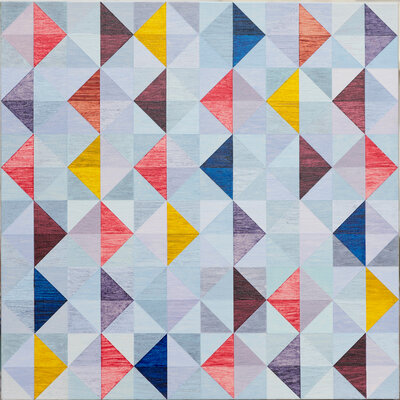Emma Biggs
Emma Biggs is a professional mosaic artist of many years experience. Her work has been shown internationally and is in collections world-wide.
Ref: S5D31763
This course is about ideas, looking at the thought processes that underlie the production of a successful mosaic. Ideas can play just as significant a role in making something visually effective as mastery of techniques – and this course aims to demonstrate how and why. To benefit from this intense course, it is preferable that you have completed at least one weekend beginners' course here at West Dean College or elsewhere. You will have already grasped the basics of how to use nippers to cut tiles.
The first day will be spent getting a sense of what you wish to achieve, with reference to materials, technique and design. It is a day of wholly practical work and class discussion. The next day begins with a slide lecture, with images chosen to illuminate aspects of the project you are aiming to undertake. From this point onwards, the entire course will be a mixture of practical, hands-on work and illustrated lectures. You can attend the lectures or not, as you wish, but the aim is that they should be a useful resource after you finish your week of study. The talks are a way of analysing the point of this meticulous art-form and what it is capable of expressing, based on illustrations of historical and contemporary mosaics, and to use this understanding to go back to the studio and apply it to work produced there.
Lectures will cover the roles of line and cutting, colour and light, form, and finally, texture. You will look not simply at what something does, but why it does it, so the course is based on issues broader than technique alone. By the end of the course, you should come away with a new or a renewed sense of the breadth of the subject, and be stimulated and inspired to take your work in mosaic further.
Arrival Day - this is the first date listed above
Courses start early evening. Residential students to arrive from 4pm, non-residential students to arrive by 6.45pm.
6.45pm: Welcome, followed by dinner (included).
8 - 9pm: First teaching session, attendance is essential.
Daily timetable
Classes 9.15 - 5pm, lunch is included.
From 6.30pm: Dinner (included for residential students).
Evening working - students may have access to workshops until 9pm, but only with their tutor's permission and provided any health and safety guidelines are observed.
Last day
Classes 9.15am - 3pm, lunch is included.
Residential students are to vacate their rooms by 10am please.
(This timetable is for courses of more than one day in length. The tutor may make slight variations)

Emma Biggs is a professional mosaic artist of many years experience. Her work has been shown internationally and is in collections world-wide.
Residential option available. Find out accommodation costs and how to book here.

Places available - Book now

Places available - Book now

Places available - Book now

Take the next step in your creative practice, with foundation level to Masters in Fine Art study.
Depending on your experience, start with an Online Foundation Certificate in Art and Design (one year, part-time), a Foundation Diploma in Art and Design made up of 10 short courses taken over two years (part-time) or advance your learning with our BA (Hons) Art and Contemporary Craft: Materials, Making, and Place (six years part-time). All will help you develop core skills, find direction in your practice and build an impressive portfolio in preparation for artist opportunities or higher-level study. See all degree and diploma courses.